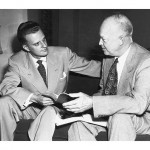If anyone wanted to know how difficult the argument against same-sex marriage is going to be for a certain group of evangelical Protestants, consider the following.
Kevin DeYoung, who is as his name suggests much younger than I, asked 40 questions of Christians who celebrated the Court’s legalization of same-sex marriage. Forty seemed high to me, and there in lies the problem, but Kevin raised a number of sensible concerns for any serious reader of Scripture, among them:
2. What Bible verses led you to change your mind?
3. How would you make a positive case from Scripture that sexual activity between two persons of the same sex is a blessing to be celebrated?
4. What verses would you use to show that a marriage between two persons of the same sex can adequately depict Christ and the church?
It doesn’t get much better for a Protestant Bible thumper (isn’t that redundant?).
Until he meets the new new evangelical. Ben Irwin, a graduate of Taylor University and Grand Rapids Theological Seminary — psss, those are not Williams College and Yale Divinity School — took Kevin’s challenge and supplied answers to — ALL — forty questions. Here are Ben’s answers to DeYoung’s request for biblical support:
1. How long have you believed that gay marriage is something to be celebrated?
I’ve been wrestling with the relevant questions and issues for the last 4-6 years.
2. What Bible verses led you to change your mind?
Well, given that “verses” are an artificial construct imposed on the Bible in the 16th century… none.
For me, it started with a friend who came out on Facebook. Then I reconnected with a relative who’s gay. I happen to think they were the best possible reasons to reassess my views. They drove me back to the text—not to see how many proof texts I could amass on one side or the other, but to see whether I could discern a broader ethic or principle, showing how God wants us to relate to his LGBTQ image bearers.
(For what it’s worth, I did revisit some of the popular proof texts, as well.)
3. How would you make a positive case from Scripture that sexual activity between two persons of the same sex is a blessing to be celebrated?
“It is not good that the man should be alone” may not only be true if you’re straight.
“Better to marry than to burn” may not only true if you’re straight.
But mostly, I would say this:
Owe no one anything, except to love one another; for the one who loves another has fulfilled the law. The commandments, “You shall not commit adultery; You shall not murder; You shall not steal; You shall not covet”; and any other commandment, are summed up in this word, “Love your neighbor as yourself.” Love does no wrong to a neighbor; therefore, love is the fulfilling of the law.
(Here’s more on how I see “love your neighbor” as the Bible’s sexual ethic.)
So at first no biblical support (from a seminary grad?). Then, a wave of the wand over the second great command to love neighbor.
By that logic, someone could justify worshiping a false god. Come to think of it, Herman Melville did just that in Moby Dick:
I was a good Christian; born and bred in the bosom of the infallible Presbyterian Church. How then could I unite with this wild idolator in worshipping his piece of wood? But what is worship? thought I. Do you suppose now, Ishmael, that the magnanimous God of heaven and earth – pagans and all included – can possibly be jealous of an insignificant bit of black wood? Impossible! But what is worship? – to do the will of God – that is worship. And what is the will of God? – to do to my fellow man what I would have my fellow man to do to me – that is the will of God. Now, Queequeg is my fellow man. And what do I wish that this Queequeg would do to me? Why, unite with me in my particular Presbyterian form of worship. Consequently, I must then unite with him in his; ergo, I must turn idolator. So I kindled the shavings; helped prop up the innocent little idol; offered him burnt biscuit with Queequeg; salamed before him twice or thrice; kissed his nose; and that done, we undressed and went to bed, at peace with our own consciences and all the world.















